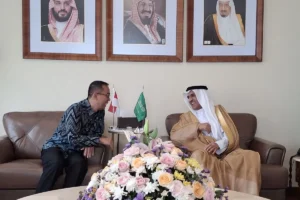Indonesian National Library intensifies collaboration for literacy development

Jakarta, The Gulf Observer: Indonesian National Library bolsters cooperation with the Ministry of Education, Culture, Research, and Technology and the Cabinet Secretariat to develop literacy and create quality Human Resources (HR).
Head of the National Library, Muhammad Syarif Bando, stated that this collaboration was a joint effort to implement the National Medium-Term Development Plan (RPJMN).
“In order to become smart, people need to study and read. The most important goal of literacy is implementing what we read,” Bando noted in a written statement received here, Friday.
He pointed out that the low reading culture in Indonesia was not caused by a lack of interest in reading, but rather, a lack of reading material.
“In fact, the mobile library is always packed with children. This shows that they actually need more books to read,” he remarked.
According to Bando, the National Library has digitized over 1.3 million library collections. Hence, to this end, his side needs support from the Ministry of Education and Culture to ensure that the National Library’s role can be utilized optimally by the community.
“We also need an official circular from the minister to the academic community and education units to utilize the National Library’s digital service. It can be accessed digitally, anywhere, with an internet connection,” Bando stated.
Meanwhile, Secretary General of the Ministry of Education and Culture, Suharti, commended the transformation carried out by the National Library.
“I hope the National Library would continue to provide better services to accommodate the people’s needs where reading is one of the efforts to develop the country,” she remarked.
Suharti also realized that her side has a responsibility to develop libraries, not only in ministries and Technical Implementation Units (UPT) in the regions but also in education units ranging from Early Childhood Education (PAUD), elementary schools, junior high schools, and high schools to public and private universities.
“All of these institutions have a big role in ensuring the achievement of quality education goals,” she noted.
Suharti is upbeat that the low literacy and numeracy competencies in Indonesia would be addressed immediately with support from the National Library, Cabinet Secretariat, and the academic community.
“The Ministry of Education and Culture has carried out various transformations, one of which is the independent curriculum. Teachers are also empowered to ensure students have good literacy and numeracy skills,” she remarked.
In an effort to advance literacy, the Ministry of Education and Culture also has a special program, namely the provision of reading books for children.
“More than 13 million copies have been sent to PAUD and elementary schools in underdeveloped areas,” she explained.
Meanwhile, Deputy for Administration of the Cabinet Secretariat, Farid Utomo, stated that the library has an important role in disseminating knowledge as well as improving the quality of human resources within the Cabinet Secretariat.
“The Cabinet Secretariat, as an institution that assists presidential management, requires quality studies that could be increased through the library,” he emphasized.
The signing of this collaboration also coincided with the commemoration of National Librarian Day on July 7.


